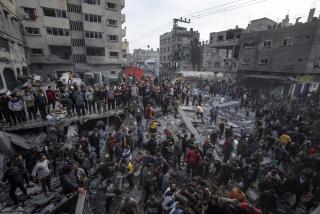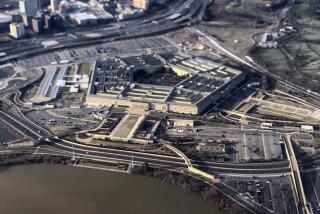U.S. troop deaths in Iraq down for month
- Share via
BAGHDAD — The U.S. military announced the deaths of seven American troops Thursday, hours after the No. 2 U.S. commander touted a decline in the number of fatalities so far this month as an indication that an increase in American forces was having a positive effect on the ground.
After three consecutive months in which more than 100 U.S. troops died, Army Lt. Gen. Raymond T. Odierno told reporters that the fatality figures appeared to be going down. However, he said he needed more time to see if the trend had staying power.
Before Odierno spoke, about 60 U.S. troops had been reported killed this month in Iraq.
“We’ve started to see a slow but gradual reduction in casualties, and it continues in July,” Odierno said at a joint news conference with Iraqi military commander Maj. Gen. Abud Qanbar. “It’s an initial positive sign, but I would argue we need a bit more time to make an assessment whether it’s a true trend.”
Odierno said he thought the decline could be traced to the U.S. military seizing terrain in Baghdad, a belt of land around the southern fringe of the capital, and Diyala province to the northeast, where it had little presence before the start of its Baghdad offensive in February.
“We topped out in May in casualties, and we kind of predicted that because we went into areas that we had not been in for a long time, and they were safe havens established by the extremists,” he said. “Going into these areas, we knew it would be tough in the beginning. We’ve now taken control of these areas.”
An additional 28,500 U.S. troops have been deployed in Iraq this year, the vast majority of them taking up residence in Baghdad neighborhoods as part of Washington’s strategy to stabilize the country.
The latest reported U.S. military deaths included a soldier killed in a gun battle in south Baghdad on Wednesday. Three Marines and a sailor also were killed Tuesday in Diyala, the site of a massive campaign in June and July to reclaim the provincial capital, Baqubah, from Sunni Arab militants.
A soldier was killed in a bomb blast Tuesday in Baghdad, and a Marine died Sunday of noncombat injuries in the western province of Al Anbar.
These fatalities raised the American military death toll in the Iraq theater to 3,645 since the U.S.-led invasion in March 2003, according to icasualties.org, a website that tracks the number of troops killed and wounded.
The string of deaths were a reminder that the number could still mount substantially before the end of July or in subsequent months.
In September, for instance, 72 U.S. troops died in Iraq, but the following month 106 were killed.
Military expert Andrew Krepinevich, president of the Washington-based Center for Strategic and Budgetary Assessments, said some militant groups might be in a tactical retreat.
“The Shia may be giving us a ‘pass’ on attacking U.S. forces, deciding to wait out the surge and letting domestic U.S. opinion do the job of getting American forces out of Iraq for them,” he said, referring to Shiite Muslim militias.
Another factor in the decrease in American fatalities might be a new partnership between U.S. forces and Sunni Arab tribes, but Krepinevich warned that that alliance could easily unravel.
Thirty-eight U.S. troops have died so far this month in Baghdad province, compared with 59 in June.
In other developments, Odierno said rockets and mortars aimed at the Green Zone, home to the U.S. Embassy and the Iraqi government, were being fired with increased accuracy in the last three months. He blamed Iran for supplying the weapons and training the Shiite militants he said were behind the attacks. His comments echoed remarks by U.S. Ambassador Ryan Crocker and Iraqi officials.
On July 10, at least 35 mortar shells and rockets pounded the fortified enclave in central Baghdad, killing at least three people, including an American, and wounding 18.
Elsewhere in the capital, a parked garbage truck packed with explosives blew up Thursday near a market in the prosperous eastern Karada district, killing at least 25 people and wounding 77, hospital and police officials said. Two small children were among the dead.
The blast leveled a four-story building and an adjoining house, burying people in rubble.
Hassan Abdul-Kareem, 31, who owns a clothes shop about 1,000 feet from the site of the explosion, said the four-story building housed apartments, private clinics and offices.
“The market was pretty active at the time of the explosion,” he said. “There were many burned victims. The street had puddles of blood, and the air smelled like burned flesh.”
A mortar round killed a pedestrian in east Baghdad, and a drive-by shooting on a highway in the capital killed two people, police said. Twenty bodies were found dumped around Baghdad.
In the northern city of Kirkuk, a car bomb exploded by a restaurant, killing five people and wounding 51 others, Police Chief Brig. Gen. Sarhad Qadir said.
In northwestern Iraq, a suicide bomber struck a police checkpoint in Tel Abta, north of Tall Afar, killing five policemen and a civilian. Twelve people were wounded, said police Brig. Gen. Mohammed Waqa. Police also said that a grenade attack in Tall Afar killed three policemen and sparked a shootout in which three gunmen were killed.
--
Times staff writers Raheem Salman, Zeena Kareem and Said Rifai contributed to this report.
More to Read
Sign up for Essential California
The most important California stories and recommendations in your inbox every morning.
You may occasionally receive promotional content from the Los Angeles Times.













